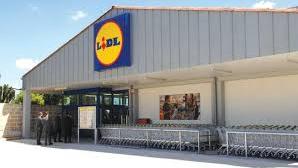New rival taking on Kroger on its home turf
Kroger Co. will be facing some new competition in Greater Cincinnati as a German discount grocer is scouting for numerous locations to open local stores.
Lidl, a store chain that has taken Europe by storm and is entering the U.S. this summer, is looking for numerous store sites in Greater Cincinnati and Dayton, according to multiple retail real estate sources. A Lidl spokesman confirmed the company has started looking at sites in Ohio, although he wouldn't give specifics.
German-based Lidl operates smaller, no-frills stores featuring discount pricing. It’s similar to another German deep-discounter, Aldi, that already operates in the U.S. Lidl is a major player in Europe. It has 10,000 stores in 27 countries and expects to expand steadily across the U.S. in future years.
“It does show some confidence that they’re willing to do this in Kroger’s backyard,” Rick Shea, who tracks the food retailing business as president of Minneapolis-based Shea Food Consultants, told me.
Lidl said in February that it would open the first 20 of its U.S. stores this summer as part of 100 planned openings within a year. Lidl has said it’s looking for store locations along the Eastern seaboard from Pennsylvania and New Jersey south to Georgia. It hadn’t given any indications it’s looking specifically in Greater Cincinnati until now.
At the same time, Aldi plans to expand its 1,600 U.S. stores to 2,000 by the end of 2018. It already has about 10 Greater Cincinnati stores.
Lidl is looking for 4-acre sites to house a 36,000-square-foot store and parking spaces for at least 180 cars. That’s about double the size of a typical Aldi store, but it’s far smaller than Kroger stores. Many Kroger Marketplace stores now top 100,000 square feet. The Kroger Marketplace store in Oakley covers 145,000 square feet, which is four times the size of a Lidl store.
Chris Nachtrab, managing director with Newmark Grubb Knight Frank, said he knows the retailer is looking at sites in Cincinnati. He’s shopped at Lidl stores in France.
“I was impressed,” Nachtrab said. “They’re going to be some real competition in this market.”
Other retail brokers said Lidl is looking at buying sites and building new stores in the region.
Cincinnati-based Kroger (NYSE: KR), the nation’s largest operator of traditional supermarkets, dominates the local grocery market. It had a market share in the high-50 percent range as of a year and a half ago and there's no indication that share has declined.
But Shea said Kroger’s dominance in Greater Cincinnati might be a reason Lidl is targeting the area. Prices in the region are likely a bit higher than in more competitive markets, he said.
“Part of Lidl’s strategy might be (entering Cincinnati) because they see Kroger is so dominant,” Shea said.
But he pointed out that Kroger has invested in offering lower prices the past few years, partly because it’s battling Wal-Mart.
“I’m not sure this is a big red flag,” Shea said. “I don’t think it’ll be dramatic.”
Lidl is likely to have an impact when it enters the Cincinnati market, Jim Hertel, senior vice president at Long Grove, Ill.-based food retail consultant Willard Bishop, an Inmar Analytics company, told me.
“It’ll take a little bit from everybody,” Hertel said. “The impact on Kroger is there, but it’s subtle and hard to detect. I call it being nibbled to death by ducks. But given enough ducks, they can do some real damage.”
He said if Lidl’s finances are similar to Aldi’s, each store might generate $125,000 a week or so. A typical Kroger store ranges from $700,000 to $1 million, so a Lidl store might take $60,000 or so from a nearby Kroger location. That’s not a huge chunk, but it’s still important.
“Kroger has been among the best over the last 15 to 20 years in responding to what’s going on in food retailing,” Hertel said. “But it’s not going to be immune. I have no doubt Lidl can succeed.”
Kroger has been facing a number of pressures lately from price-cutting wars with Wal-Mart to food price deflation. It had a 13-year streak of consecutive quarters posting same-store sales growth snapped in its fourth fiscal quarter.
Lidl’s U.S. expansion is an indication of the grocery market becoming segmented. Traditional supermarkets like Kroger are battling premium stores such as Whole Foods and Fresh Thyme as well as discounters like Aldi and Lidl, Shea said.
“Lidl sees an opportunity there,” Shea said.
Lidl’s strategy is to offer high quality but low prices.
“Customers are being forced to choose between quality, price and convenience, and this is a compromise they shouldn’t have to make,” Lidl U.S. president Brendan Proctor said in a statement in Feburary. “At Lidl, we are committed to delivering outstanding quality goods to our customers at market leading prices. We are carefully curating our selection to ensure every choice in our stores is a great choice for our customers.”

No comments:
Post a Comment